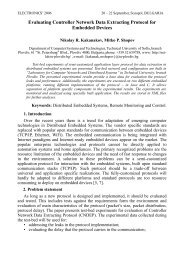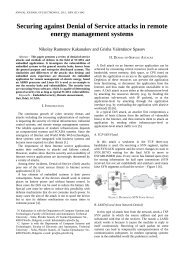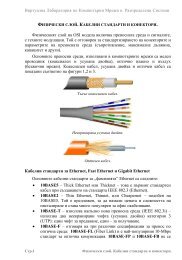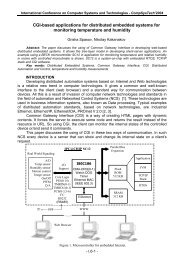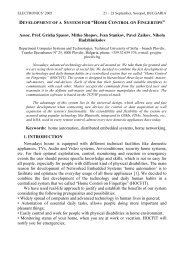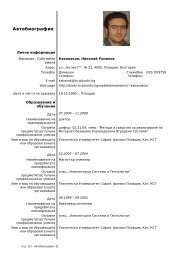SIM300D AT Command Set - Distributed Systems and Networking
SIM300D AT Command Set - Distributed Systems and Networking
SIM300D AT Command Set - Distributed Systems and Networking
Create successful ePaper yourself
Turn your PDF publications into a flip-book with our unique Google optimized e-Paper software.
<strong>SIM300D</strong> <strong>AT</strong> <strong>Comm<strong>and</strong></strong> <strong>Set</strong><br />
Confidential SIMCOM<br />
6.2 Definition of Unsolicited Result Codes<br />
Not all proactive comm<strong>and</strong>s are required to be visible to the application. For example, the<br />
proactive comm<strong>and</strong>s More Time <strong>and</strong> Provide Local Information are transparent <strong>and</strong> therefore do<br />
not require an unsolicited result code to be sent to the user. The comm<strong>and</strong>s, which are relevant for<br />
user interaction in one form or another, are listed in the following tables.<br />
The output generated for strings is controlled by the +CMGF <strong>AT</strong> comm<strong>and</strong>. The factory default<br />
for string output is PDU mode where strings are output in HEX. The tables below illustrate the<br />
alternative mechanism of TEXT output; this is obtained by using the +CMGF <strong>AT</strong> comm<strong>and</strong> with a<br />
parameter of one.<br />
6.2.1 +STC <strong>Comm<strong>and</strong></strong><br />
+STC Informs the application of the type of proactive SIM comm<strong>and</strong> data awaiting<br />
retrieval.<br />
Result Code:<br />
+STC: <br />
Reference Note<br />
Parameters<br />
Hexadecimal format of Type of <strong>Comm<strong>and</strong></strong> . Unique identifier for<br />
<strong>SIM300D</strong>_<strong>AT</strong>_V1.00 Page 111 of 180<br />
the current SIM Toolkit proactive comm<strong>and</strong> issued by the SIM -<br />
The following values are supported:<br />
‘10’ Get Acknowledgement For <strong>Set</strong> Up Call comm<strong>and</strong><br />
‘15’ Launch Browser comm<strong>and</strong><br />
‘20’ Play Tone comm<strong>and</strong><br />
‘21’ Display Text comm<strong>and</strong><br />
‘22’ Get Inkey comm<strong>and</strong><br />
‘23’ Get Input comm<strong>and</strong><br />
‘24’ Select Item comm<strong>and</strong><br />
‘25’ <strong>Set</strong> Up Menu comm<strong>and</strong><br />
‘28’ <strong>Set</strong> Up Idle Mode Text comm<strong>and</strong><br />
‘40’ Open Channel comm<strong>and</strong><br />
‘14’ Send DTMF comm<strong>and</strong><br />
‘05’ <strong>Set</strong> Up Event List comm<strong>and</strong><br />
‘81’ End of proactive session<br />
The special case is +STC: 0 that is issued when there is no STK application<br />
accessible on the SIM.<br />
The following tables in this section detail the information that is distributed to the application for<br />
proactive indications using unsolicited result codes. The information applicable to the proactive<br />
comm<strong>and</strong> is sent to the application using the +STUD (SIM Toolkit Unsolicited Data) results code.



